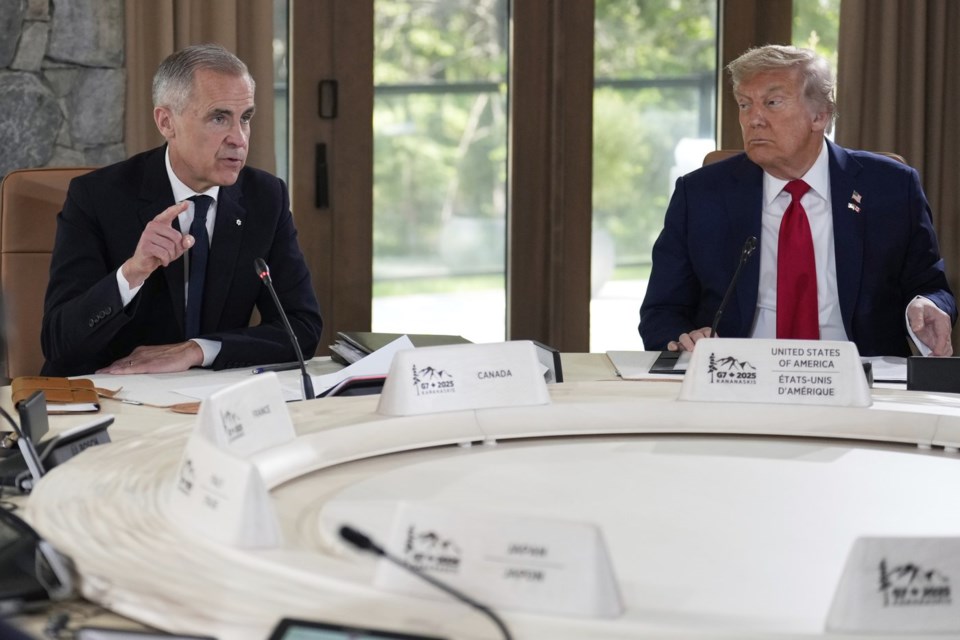KANANASKIS — G7 leaders issued a series of joint statements on a variety of topics as the summit in Alberta came to a close Tuesday afternoon — but could not reach agreement on a statement about the ongoing war in Ukraine.
As expected, the leaders did not issue a joint communiqué — the lengthy statement outlining shared views that typically ends G7 summits.
Instead, there were several statements on individual issues ranging from transnational repression and migrant smuggling to AI and quantum technology.
Ukraine was not among them, even though Prime Minister Mark Carney made the war in Ukraine one of the summit's key discussion topics on Tuesday, and after President Volodymyr Zelenskyy attended the event in person.
A senior Canadian government official — who briefed reporters on background because they are not authorized to speak publicly about the G7 leaders' negotiations — said the U.S. was offside with the other countries on issuing a statement on Ukraine and sought weaker language than what the other members proposed.
Canada planned to use the language the other countries agreed to in its closing chair's statement, which had yet to be released by mid-afternoon. Ottawa did not want to release a weak statement, the source said.
The official said that it was challenging to get the U.S. to agree on a statement on Ukraine in part because it's trying to negotiate a ceasefire or peace deal between Russia and Ukraine.
Carney outlined $4.3 billion in new Canadian support for Ukraine's defence and another set of sanctions on Russia as he met with Zelenskyy on the sidelines of the G7 summit on Tuesday morning.
That sum includes $2 billion for the purchase and donation of weapons and material, along with a $2.3-billion loan to help the embattled country rebuild its infrastructure, to be repaid by interest on frozen Russian assets.
French President Emmanuel Macron said Carney fulfilled his mission as G7 host by preserving the unity of the multilateral organization.
"We shouldn't ask the Canadian presidency to resolve every issue on earth today. That would be unfair. But he held the group together," said Macron, who will host the G7 next year.
The G7 leaders note they are "deeply concerned by growing reports of transnational repression," defined in the statement as an aggressive form of foreign interference which sees states or their proxies try to intimidate, harass, harm or coerce people outside their borders.
The statement condemns all forms of transnational repression, which can include activities ranging from cyber-surveillance to assassination.
It calls on member countries to report on transnational repression in the G7 Rapid Response Mechanism public reports, and to develop a framework to co-operate on countering such activities.
The statement was published just before Carney was set to meet with his Indian counterpart, Narendra Modi, whose government has been singled out by Canadian intelligence officials as a prolific perpetrator of foreign interference in Canada, including transnational repression.
As their bilateral meeting began Tuesday, Carney said it was "a great honour" to host Prime Minister Modi at the G7.
"It's a testament to the importance of your country, to your leadership, and to the importance of the issues that we look to tackle together," Carney said, noting those issues include the energy transition, the future of AI and the fight against transnational repression and terrorism.
Speaking through a translator, Modi said attending the G7 summit offers a great opportunity to serve the world.
"I believe that India-Canada relations are extremely important, and India and Canada should work together," Modi said, noting that the two countries share democratic values.
Carney invited Modi to the summit along with a number of other world leaders who are not part of the G7. Modi's visit prompted loud protest from Sikh separatist groups.
In 2023 and 2024, former prime minister Justin Trudeau and the RCMP said there was evidence linking agents of the Indian government to the murder of Canadian Sikh separatist activist Hardeep Singh Nijjar in Surrey, B.C., in June 2023.
Last October, RCMP Commissioner Mike Duheme said the police force had evidence linking Indian government officials to other crimes in Canada, including extortion, coercion and homicide.
The G7 leaders also signed on to a statement pledging to tackle migrant smuggling. The statement said the G7 "will explore, consistent with our legal systems, the potential use of sanctions to target criminals involved in migrant smuggling and human trafficking operations from countries where those activities emanate."
A wider group of signatories, which includes Australia, India and South Korea, is committing to working together to invest in responsible critical minerals projects.
Australia, India, Mexico, South Korea and South Africa also signed on with the G7 to a wildfire charter that calls for co-operation to prevent, fight and recover from devastating fires.
The G7 leaders did release a statement Monday evening calling for a de-escalation of hostilities in the Middle East in response to continued fighting between Israel and Iran.
That came shortly before U.S. President Donald Trump announced he planned to leave the summit a day early to deal with the ongoing crisis. Treasury Secretary Scott Bessent remained in Kananaskis on Tuesday as the American delegation's lead.
— With files from Emilie Bergeron in Kananaskis and Sarah Ritchie in Ottawa
This report by The Canadian Press was first published June 17, 2025.
Dylan Robertson, The Canadian Press



